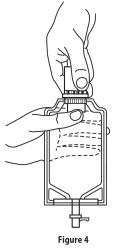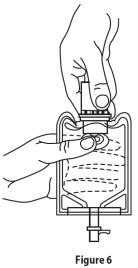Medication Guide
Health Professional Information
{{section_name_patient}}
{{section_body_html_patient}}
Prescribing Information
Health Professional Information
Dosage and Administration
2 DOSAGE AND ADMINISTRATION
[see Indications and Usage (1) and Clinical Pharmacology (12.3)].
2.1 Community-Acquired Pneumonia
The recommended dose of Azithromycin for Injection, USP for the treatment of adult patients with community-acquired pneumonia due to the indicated organisms is 500 mg as a single daily dose by the intravenous route for at least two days. Intravenous therapy should be followed by azithromycin by the oral route at a single, daily dose of 500 mg, administered as two 250-mg tablets to complete a 7- to 10-day course of therapy. The timing of the switch to oral therapy should be done at the discretion of the physician and in accordance with clinical response.
2.2 Pelvic Inflammatory Disease
The recommended dose of Azithromycin for Injection, USP for the treatment of adult patients with pelvic inflammatory disease due to the indicated organisms is 500 mg as a single daily dose by the intravenous route for one or two days. Intravenous therapy should be followed by azithromycin by the oral route at a single, daily dose of 250 mg to complete a 7-day course of therapy. The timing of the switch to oral therapy should be done at the discretion of the physician and in accordance with clinical response.
2.3 Preparation of the Solution for Intravenous Administration
The infusate concentration and rate of infusion for Azithromycin for Injection, USP should be 2 mg/mL over 1 hour. Azithromycin for Injection, USP should not be given as a bolus or as an intramuscular injection.
Reconstitution
Instructions for Use
These instructions for use should be made available to the individuals who perform the reconstitution steps.
Parenteral drug products should be inspected visually for particulate matter prior to administration. If particulate matter is evident in reconstituted fluids, the drug solution should be discarded.
To Open
Peel overwrap at corner and remove solution container. Some opacity of the plastic due to moisture absorption during the sterilization process may be observed. This is normal and does not affect the solution quality or safety. The opacity will diminish gradually.
To Assemble Vial and Flexible Diluent Container:
(Use Aseptic Technique)
- 1.
- Remove the protective covers from the top of the vial and the vial port on the diluent container as follows:
- a.
- To remove the breakaway vial cap, swing the pull ring over the top of the vial and pull down far enough to start the opening (See Figure 1.), then pull straight up to remove the cap. (See Figure 2.)
- NOTE: Once the breakaway cap has been removed, do not access vial with syringe.
- b.
- To remove the vial port cover, grasp the tab on the pull ring, pull up to break the three tie strings, then pull back to remove the cover. (See Figure 3.)
- 2.
- Screw the vial into the vial port until it will go no further. THE VIAL MUST BE SCREWED IN TIGHTLY TO ASSURE A SEAL. This occurs approximately 1/2 turn (180°) after the first audible click. (See Figure 4.) The clicking sound does not assure a seal; the vial must be turned as far as it will go.
NOTE: Once vial is seated, do not attempt to remove. (See Figure 4.) - 3.
- Recheck the vial to assure that it is tight by trying to turn it further in the direction of assembly.
- 4.
- Label appropriately.
To Reconstitute the Drug
If the rubber stopper is not removed from the vial and medication is not released on the first attempt, the inner cap may be manipulated back into the rubber stopper without removing the drug vial from the diluent container. Repeat steps 3 through 5. |
Dilute this solution further prior to administration as instructed below.
Dilution
Azithromycin for Injection, USP ADD-Vantage® vials must be diluted prior to IV administration with the ADD-Vantage® diluent container [see Dosage and Administration (2.3)]. The ADD-Vantage® vial should be joined with a 250 mL ADD-Vantage® flexible diluent container (5% dextrose injection, 0.9% sodium chloride injection or 0.45% sodium chloride injection).
It is recommended that a 500-mg dose of Azithromycin for Injection, diluted as above, be infused over a period of not less than 60 minutes.
Other intravenous substances, additives, or medications should not be added to Azithromycin for Injection, or infused simultaneously through the same intravenous line.
Preparation for Administration
(Use Aseptic Technique)
- 1.
- Confirm the activation and admixture of vial contents.
- 2.
- Check for leaks by squeezing container firmly. If leaks are found, discard unit as sterility may be impaired.
- 3.
- Close flow control clamp of administration set.
- 4.
- Remove cover from outlet port at bottom of container.
- 5.
- Insert piercing pin of administration set into port with a twisting motion until the pin is firmly seated. NOTE: See full directions on administration set carton.
- 6.
- Lift the free end of the hanger loop on the bottom of the vial, breaking the two tie strings. Bend the loop outward to lock it in the upright position, then suspend container from hanger.
- 7.
- Squeeze and release drip chamber to establish proper fluid level in chamber.
- 8.
- Open flow control clamp and clear air from set. Close clamp.
- 9.
- Attach set to venipuncture device. If device is not indwelling, prime and make venipuncture.
- 10.
- Regulate rate of administration with flow control clamp.
WARNING: Do not use flexible container in series connections.
Storage
When diluted according to the instructions (2 mg/mL), Azithromycin for Injection is stable for 24 hours at or below room temperature (30°C or 86°F), or for 7 days if stored under refrigeration (5°C or 41°F).
Additional Resources
Chat online with Pfizer Medical Information regarding your inquiry on a Pfizer medicine or vaccine.
Speak with a Pfizer Medical Information Professional regarding your Pfizer medicine or vaccine inquiry.
Available 9AM-5PM ET Monday to Friday; excluding holidays.
Submit a medical question for a Pfizer medicine or a vaccine.
The submission will be reviewed during our standard business hours.
To report an adverse event related to a Pfizer product and you are not part of a clinical trial* for this medication, click the link below to submit your information:
Pfizer Safety Reporting Site
*If you are involved in a clinical trial for either product, adverse events should be reported to your coordinating study site.
If you cannot use the above website to report an adverse event related to a Pfizer medication, please call (800) 438-1985.
You may also contact the U.S. Food and Drug Administration (FDA) directly to report adverse events or product quality concerns either online at www.fda.gov/medwatch or by calling (800) 332-1088.






